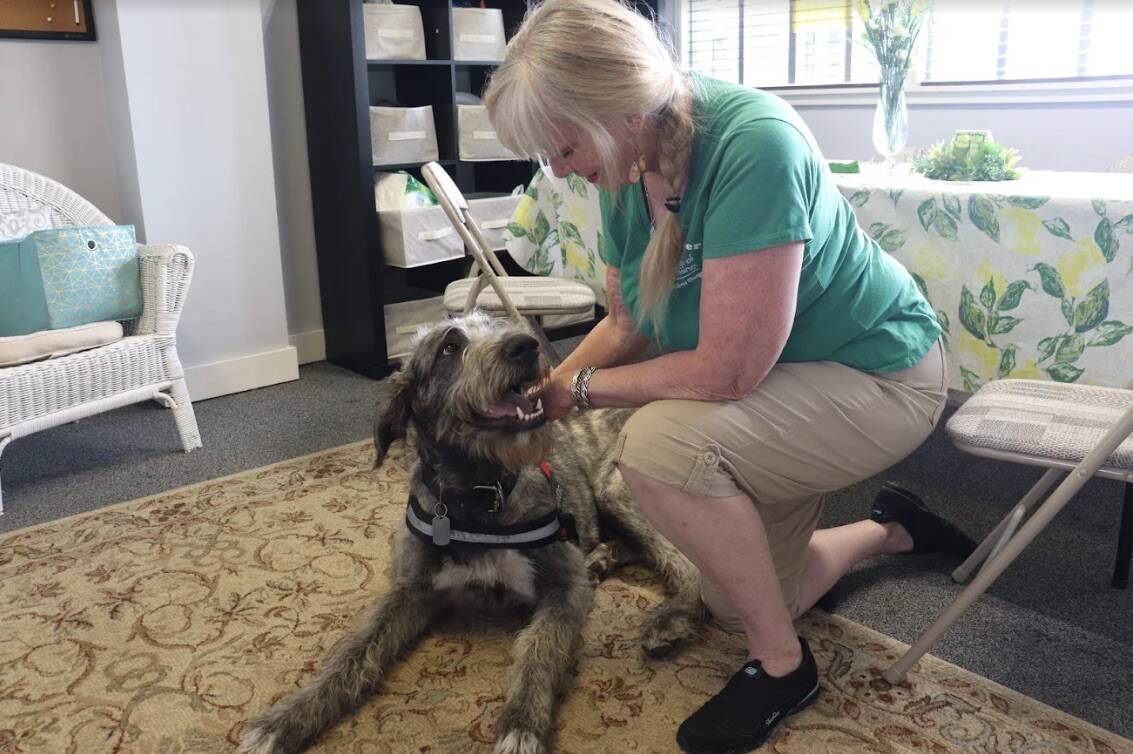Brody is only 8 months old and already weighs 130 pounds. He could weigh up to 180 pounds by the time he’s 3 years old.
Despite his massive size, the purebred Irish wolfhound has the perfect gentle disposition of a service dog. Like all service dogs, Brody helps his owner, TJ Harmon Fisher, lead a more independent life despite her disability.
Harmon Fisher wants people to know the important role service dogs play in people’s lives, and the differences between them and emotional support animals.
Service dogs extensive training to perform a medically related service. This differentiates service dogs from emotional support animals, who provide comfort and companionship to those with a mental health or psychiatric disability.
Brody provides more than just companionship for his owner, Harmon Fisher. He is trained to assist her with mobility and balance. Harmon Fisher is the president of the board for Garage of Blessings, an Oak Harbor nonprofit that offers free clothes, toiletries, household goods and other items to those in need. With Brody’s help, she is still able to work and give back to her community.
Harmon Fisher was in a bad car accident a few years ago. She broke her neck and, as a result, has lost a lot of nerve conduction and muscle control on her left side.
“It throws my balance off,” she said. “So I can be walking along and suddenly fall over, or think my foot’s where it should be and it isn’t.”
Service dogs come in all shapes and sizes. An Irish wolfhound is perfect for Harmon Fisher’s needs, she said. Brody’s impressive size helps her stay upright.
“When I start losing balance, he literally hip checks me,” she said.
Brody is also able to tell when her blood sugar is too low or if she’s at risk for having a seizure by pushing against her until she sits down. If she falls, he is trained to alert others by barking or by actually finding another human since she lives in an isolated rural area.
Brody has been in training since he was 10 weeks old. Harmon Fisher purchased him from an Irish wolfhound breeder, where she got her previous service dog that passed away suddenly last year.
One of the big challenges for people who have disabilities and rely on service dogs are “people who are claiming emotional support dogs, or another type of animal, or one that is not trained at all as a service dog,” Harmon Fisher said.
There is no federal registry for service dogs or official training. Owners can go through a professional trainer, or they can train their dogs themselves.
Brody has had professional training and received the American Kennel Club’s Canine Good Citizen certification.
“It is not a service dog certification but it does make them a welcome community member when out in public,” explained Sarah Bank, associate public relations manager of the American Kennel Club.
Harmon Fisher recently had an experience at a local restaurant where a service dog was behaving badly and asked to leave the restaurant. Poorly behaved emotional support animals, or service dogs that haven’t received enough training, can sometimes give service dogs a bad reputation. Businesses are allowed to ask service animals to leave the establishment and can make the decision not to allow them indoors.
“An emotional support dog does a wonderful, wonderful thing,” Harmon Fisher said. “I’m not undermining those at all.”
However, emotional support dogs are not meant to provide a medical-related job, and are therefore not considered service dogs under the American Disabilities Act.
“A true service dog lays down beside your seat, and does not react to the food, does not react to the people,” she said. “They lay there and they behave until it’s time to go.”
Brody is not yet done with his training. Generally, it takes two years to fully train a service dog.
Harmon Fisher takes him everywhere. People who come to the Garage of Blessings will see him beside her while she is working. If Brody is working, she will ask folks not to pet him as he needs to be focused on her. She travels with him and is able to take him on airplanes when sitting in a bulkhead seat so he has enough legroom. She relies on him everyday.
“I ask people to think of him as any other medical device,” she said. “It’s just like somebody who needs a wheelchair.”


